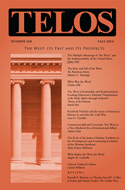Consider the Aristotelian maxim that humankind “is by nature a political animal,” whose capacity for speech, unique “among the animals[,] . . . serves to reveal the advantageous and the harmful, and hence also the just and the unjust.” If one accepts this dictum (and, crucial to this article’s line of thinking, by no means must one necessarily adhere to Aristotle’s rationalist model of “man,” nor any other universalist account of humanness), then the ceaseless question remains: what specific sort(s) of speaking, morally reasoning animal might the human be read as constituting, from within the interpretive mindset of a particular historical and civilizational milieu? Of course, this question presupposes, in a manner that may well be at odds with the anthropological premises of a universalist modern political doctrine like human rights, that, rather than exhibiting a fixed, unitary essence, the human acts as a signifier; as such, this human signifier might potentially refer to myriad worldviews, and sources and assemblages of contextualizing meaning, across which the understanding of humanness can be differently constructed and construed.
|
On The Agenda with Steve Paikin, Michael Millerman discusses the philosophy of Alexander Dugin and its influence on Vladimir Putin and contemporary Russian geopolitics. It’s a wide-ranging interview that covers Dugin’s theory of Eurasianism, his critique of the West and liberal democracy, the defense of Russia as a unique, non-Western civilization in its own right, the compatibility of Dugin’s anti-communism with the view that the collapse of the Soviet Union was a geopolitical catastrophe, the difference between Western multiculturalism and the kind of multicivilizational diversity that Dugin advocates, and much more. Watch the full interview below. In addition to co-translating Dugin’s The Fourth Political Theory (Arktos, 2012), Michael is also a former Telos intern. You can read more of his writing in the TELOSscope archives. Angelo M. Codevilla’s “What Makes the West the West?” appears in Telos 168 (Fall 2014). Read the full version online at the Telos Online website, or purchase a print copy of the issue in our store. In this short video, filmed at the recent Telos Conference in L’Aquila, Editor Russell A. Berman talks about the central themes and concerns of Telos 168 (Fall 2014): The West: Its Past and Its Prospects. We have posted Russell’s full introduction here, and you can order your copy of the issue in our online store. Telos 168 (Fall 2014) is now available for purchase in our store. |
||||
|
Telos Press Publishing · PO Box 811 · Candor, NY 13743 · Phone: 212-228-6479 Privacy Policy · Data Protection Copyright © 2025 Telos Press Publishing · All Rights Reserved |
||||
 The intellectual-moral propositions that make the West the West are particular and exclusive to our civilization. They are indefensible, incomprehensible nonsense except in terms of Jerusalem and Athens. The ideas that distinguish the West’s forma mentis follow from the Biblical teaching that God created the universe by and through logos. This beckons our reason. The charter of human equality and freedom, unique to the West, is the Biblical teaching that man is created in the image and likeness of God. The West’s distinctiveness follows as well from Parmenides of Elea’s distinction between opinions and the truth of “the things that are.” This empowered human reason to access the logos of the universe. Consequently, reason distinguished between positive law—what is right by human will—and what is right by nature—natural law.
The intellectual-moral propositions that make the West the West are particular and exclusive to our civilization. They are indefensible, incomprehensible nonsense except in terms of Jerusalem and Athens. The ideas that distinguish the West’s forma mentis follow from the Biblical teaching that God created the universe by and through logos. This beckons our reason. The charter of human equality and freedom, unique to the West, is the Biblical teaching that man is created in the image and likeness of God. The West’s distinctiveness follows as well from Parmenides of Elea’s distinction between opinions and the truth of “the things that are.” This empowered human reason to access the logos of the universe. Consequently, reason distinguished between positive law—what is right by human will—and what is right by nature—natural law. 

